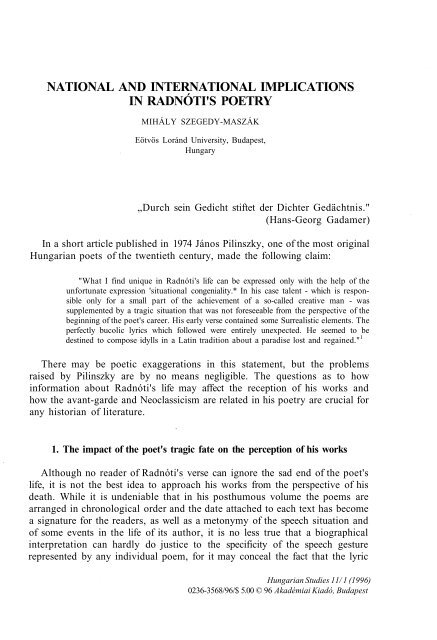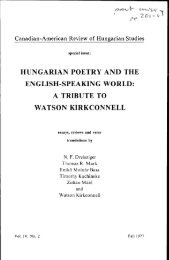12 GEORGE GÖMÖRI<strong>No</strong>tes<strong>1.</strong> Miklós Radnóti, The Complete Poetry, transi. Emery George (Ann Arbor, 1980), 58. (Hence:CP).2. Radnóti Miklós összes művei (Budapest, 1976), 18. (Hence: RMöm), (My translation).3. Emery George, Miklós Radnóti, A Biography (New York, 1986).4. Radnóti, CP, 60.5. Ibid., 87; RMöm, 47.6. Béla Pomogáts, Radnóti Miklós (Budapest, 1977), 33.7. Ibid., For the original text see RMöm, 66<strong>1.</strong>8. Radnóti, CP, 88.9. Marianna D. Birnbaum, Miklós Radnóti, A Biography of His Poetry (Munich, 1983), 139.10. RMöm, 605.<strong>1<strong>1.</strong></strong> Radnóti, CP, 126; RMöm, 87.12. Radnóti, CP, 159. Emery George's translation.13. Miklós Radnóti, Forced March. Selected Poems, transi. George Gömöri and Clive Wilmer(Manchester, 1979) 18, and RMöm, 133.14. Ibid.15. Radnóti Miklós, Napló (Budapest, 1989), 52.16. Radnóti, CP, 189; RMöm, 153.17. Radnóti, CP, 192; RMöm, 156.18. The Holy Bible. Revised Version (London, 1952), 975.19. Radnóti, Napló, 25.20. Ady Endre Összes Versei, vol. 2 (Budapest, 1955), 272.2<strong>1.</strong> Ibid., 265.22. Radnóti, Forced March, 39; RMöm, 213.23. Radnóti, CP, 262; RMöm, 227. Emery George's translation.24. RMöm, 23<strong>1.</strong>25. Kosztolányi Dezső, Válogatott versei (Budapest, 1956), 275.26. RMöm, 232.27. Forced March, 52; RMöm, 238.28. Ibid.; RMöm, 239.29. Ibid., "Majdan az én torz számat is érintette, akárcsak / bölcs Izaiasét, szénnel az Űr..."30. Ibid.
NATIONAL AND INTERNATIONAL IMPLICATIONSIN RADNÓTI'S POETRYMIHÁLY SZEGEDY-MASZÁKEötvös Loránd University, Budapest,Hungary„Durch sein Gedicht stiftet der Dichter Gedächtnis."(Hans-Georg Gadamer)In a short article published in 1974 János Pilinszky, one of the most originalHungarian poets of the twentieth century, made the following claim:"What I find unique in Radnóti's life can be expressed only with the help of theunfortunate expression 'situational congeniality.* In his case talent - which is responsibleonly for a small part of the achievement of a so-called creative man - wassupplemented by a tragic situation that was not foreseeable from the perspective of thebeginning of the poet's career. His early verse contained some Surrealistic elements. Theperfectly bucolic lyrics which followed were entirely unexpected. He seemed to bedestined to compose idylls in a Latin tradition about a paradise lost and regained." 1There may be poetic exaggerations in this statement, but the problemsraised by Pilinszky are by no means negligible. The questions as to howinformation about Radnóti's life may affect the reception of his works andhow the avant-garde and Neoclassicism are related in his poetry are crucial forany historian of literature.<strong>1.</strong> The impact of the poet's tragic fate on the perception of his worksAlthough no reader of Radnóti's verse can ignore the sad end of the poet'slife, it is not the best idea to approach his works from the perspective of hisdeath. While it is undeniable that in his posthumous volume the poems arearranged in chronological order and the date attached to each text has becomea signature for the readers, as well as a metonymy of the speech situation andof some events in the life of its author, it is no less true that a biographicalinterpretation can hardly do justice to the specificity of the speech gesturerepresented by any individual poem, for it may conceal the fact that the lyricHungarian Studies 11/ 1 (1996)0236-3568/96/$ 5.00 © 96 Akadémiai Kiadó, Budapest
- Page 1 and 2: Papers of the Radnóti Memorial Con
- Page 3: HUNGARIAN STUDIESVOLUME 11, 1996 CO
- Page 8 and 9: 6 GEORGE GÖMÖRIprobably Fürst an
- Page 10 and 11: 8 GEORGE GÖMÖRIof the utmost impo
- Page 12 and 13: 10 GEORGE GÖMÖRIén e földön...
- Page 16 and 17: 14 MIHÁLY SZEGEDY-MASZÁKself alwa
- Page 18 and 19: 16 MIHÁLY SZEGEDY-MASZÁKtype is r
- Page 20 and 21: 18 MIHÁLY SZEGEDY-MASZÁKpose, the
- Page 22 and 23: 20 MIHÁLY SZEGEDY-MASZÁK"Wozu Dic
- Page 24 and 25: 22 MIHÁLY SZEGEDY-MASZÁKand Wilme
- Page 26 and 27: 24 MIHÁLY SZEGEDY-MASZÁKbeen the
- Page 28 and 29: 26 MIHÁLY SZEGEDY-MASZÁKBolond, k
- Page 30 and 31: 28 MIHÁLY SZEGEDY-MASZÁK6. Emery
- Page 32 and 33: 30 ZSUZSANNA OZSVÁTHand breaks as
- Page 34 and 35: 32 ZSUZSANNA OZSVÁTHThe drama echo
- Page 36: 34 ZSUZSANNA OZSVÁTHcontinents at
- Page 39 and 40: FROM CAIN TO NAHUM 37which, as Csap
- Page 41 and 42: \FROM CAIN TO NAHUM 39and bears and
- Page 43 and 44: FROM CAIN TO NAHUM 41who sees what
- Page 45 and 46: FROM CAIN TO NAHUM 438. "A félelme
- Page 47 and 48: HELP ME, PASTORAL MUSE:THE VIRGELIA
- Page 49 and 50: HELP ME, PASTORAL MUSE 47compete! W
- Page 51 and 52: HELP ME, PASTORAL MUSE 49of a priva
- Page 53 and 54: HELP ME, PASTORAL MUSE 51Once again
- Page 55 and 56: HELP ME, PASTORAL MUSE 53Eighth Ecl
- Page 57 and 58: HELP ME, PASTORAL MUSE 55have that
- Page 59: HELP ME, PASTORAL MUSE 57Paul de Ma
- Page 62 and 63: 60 SAMUEL J. WILSONWe did, however,
- Page 64 and 65:
62 SAMUEL J. WILSONbeings and contr
- Page 66 and 67:
64 SAMUEL J. WILSONHungarians would
- Page 68 and 69:
66 SAMUEL J. WILSONthe Austrians. G
- Page 70 and 71:
68 SAMUEL J. WILSONnorth-eastern Zi
- Page 72 and 73:
70 SAMUEL J. WILSONoriginally pursu
- Page 74 and 75:
72 SAMUEL J. WILSONGörgey's decisi
- Page 76 and 77:
74 SAMUEL J. WILSONfrom occurring,
- Page 78 and 79:
76 SAMUEL J. WILSON8. Artúr Görge
- Page 80 and 81:
78 STEVEN TÖTÖSY de ZEPETNEKtört
- Page 82 and 83:
80 STEVEN TÖTÖSY de ZEPETNEKThe c
- Page 84 and 85:
82 STEVEN TÖTÖSY de ZEPETNEKher u
- Page 86 and 87:
84 STEVEN TÖTÖSY de ZEPETNEKthe b
- Page 88 and 89:
86 STEVEN TÖTÖSY de ZEPETNEKrooti
- Page 90 and 91:
88 STEVEN TÖTÖSY de ZEPETNEKcriti
- Page 92 and 93:
90 STEVEN TÖTÖSY de ZEPETNEK'My f
- Page 94 and 95:
92 STEVEN TÖTÖSY de ZEPETNEKshe d
- Page 96 and 97:
94 STEVEN TÖTÖSY de ZEPETNEKNotes
- Page 99 and 100:
BERLIN ET PARIS DE LAJOS TIHANYIVAL
- Page 101 and 102:
BERLIN ET PARIS DE LAJOS TIHANYI 99
- Page 103 and 104:
BERLIN ET PARIS DE LAJOS TIHANYI 10
- Page 105 and 106:
BERLIN ET PARIS DE LAJOS TIHANYI 10
- Page 107 and 108:
BERLIN ET PARIS DE LAJOS TIHANYI 10
- Page 109 and 110:
BERLIN ET PARIS DE LAJOS TIHANYI 10
- Page 111 and 112:
BERLIN ET PARIS DE LAJOS TIHANYI 10
- Page 113 and 114:
BERLIN ET PARIS DE LAJOS TIHANYI 11
- Page 115:
BERLIN ET PARIS DE LAJOS TIHANYI 11
- Page 118 and 119:
116 KEVIN E. KELLYfilms Lugosi made
- Page 120 and 121:
118 KEVIN E. KELLYthe provinces, no
- Page 122 and 123:
120 KEVIN E. KELLYWith his brief an
- Page 124 and 125:
122 KEVIN E. KELLYboth his and Dean
- Page 126 and 127:
124 KEVIN E. KELLYfollowed it into
- Page 128 and 129:
126 KEVIN E. KELLYvampiric nobleman
- Page 130 and 131:
128 KEVIN E. KELLYThe film also boo
- Page 132 and 133:
130 KEVIN E. KELLYWood remained one
- Page 134 and 135:
132 KEVIN E. KELLYLugosi, convinced
- Page 136 and 137:
134 KEVIN E. KELLY19. Lennig, 112-1
- Page 139 and 140:
THE AGON OF IRONY AND SATIREIN GYÖ
- Page 141 and 142:
THE AGON OF IRONY AND SATIRE 139poe
- Page 143 and 144:
THE AGON OF IRONY AND SATIRE 141tra
- Page 145 and 146:
THE AGON OF IRONY AND SATIRE 143fek
- Page 147 and 148:
THE AGON OF IRONY AND SATIRE 145ner
- Page 149 and 150:
THE AGON OF IRONY AND SATIRE 147whi
- Page 151 and 152:
THE AGON OF IRONY AND SATIRE 149mov
- Page 153 and 154:
THE AGON OF IRONY AND SATIRE 151for
- Page 155 and 156:
THE AGON OF IRONY AND SATIREA harma
- Page 157 and 158:
MURDER IN THE MOUNTAINSTranslated b
- Page 159 and 160:
MURDER IN THE MOUNTAINS 157"Afraid?
- Page 161 and 162:
MURDER IN THE MOUNTAINS 159Abády,
- Page 163 and 164:
MURDER IN THE MOUNTAINS 161"The mar
- Page 165 and 166:
MURDER IN THE MOUNTAINS 163Bálint
- Page 167 and 168:
MURDER IN THE MOUNTAINS 165"That is
- Page 169 and 170:
MURDER IN THE MOUNTAINS 167at hand,
- Page 171 and 172:
CONTRIBUTORSMiklós BÁNFFYLászló
















